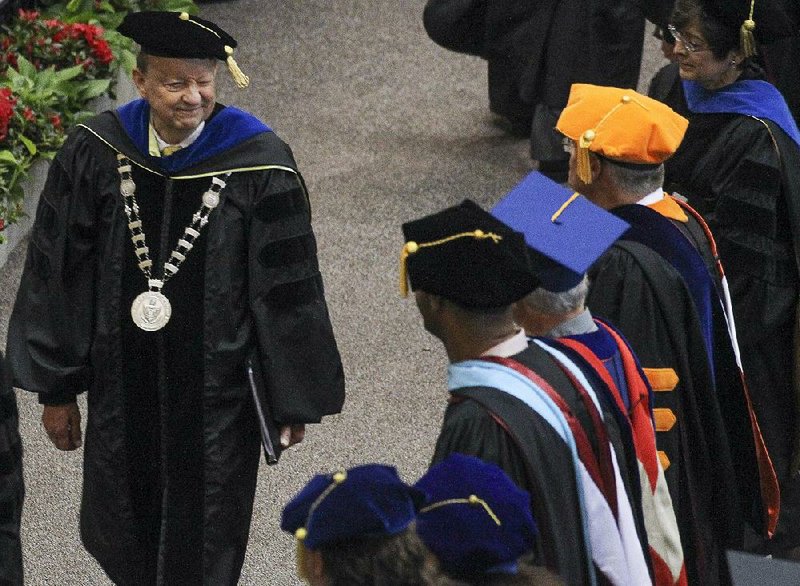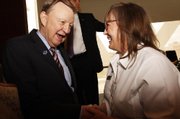Joel Anderson stood at the top of a staircase at the Jack Stephens Center and looked out.
He was stoic, with the corner of his mouth curving upward as he saw the smiles, tears and hugs.
To his left milled a thinning crowd of graduates, families and friends. To his right stretched the expanse that is the University of Arkansas at Little Rock.
He took it all in. It was the beginning of the end: his last round of graduation ceremonies, his favorite days of the year.
In a few moments, he would pause to talk to more families before reaching his campus home across 28th Street.
In a few hours, he would finish with the pomp and circumstance of the day. He would take off a heavy silver medallion, which he wears for the occasion and which will one day bear his name with those of the university's other former chancellors. He would put it away in its velvet casing and hang up his hood -- the colors of the University of Michigan, his alma mater -- for good.
In a few weeks, he and his wife, Ann, would move out of that home and into one of their own in west Little Rock.
And in a few weeks, at 74, Anderson would start his transition from being the head of UALR -- the university he has served for 45 years, the past 13 as chancellor -- to ordinary citizen.
"A lot of people are wondering what he's going to do now," said David Pryor, a University of Arkansas System trustee. "He's a young guy. He'll take on any issue. He is not a Johnny-come-lately. He is committed. Who knows?"
'A debt of gratitude'
Just days before the graduation ceremonies, co-workers, friends and family gathered for a roast-and-toast for Anderson, who officially retired June 30. It was heavy on the toasting and light on the roasting.
"I'm really proud of the fact that you're a fellow Jackson County-Independence County-White River rat," former Gov. Mike Beebe said in a farewell video that night. "Many folks thought neither one of us would amount to much coming out of some of the places that you and I came from. But you've done very well. And the whole state of Arkansas owes you a debt of gratitude."
It was just the start of Anderson's commendations. Each time, he was grateful.
"He's not that gregarious, outgoing, boisterous, fun kind of personality, but is a very fun person and has an amazing wit," said Jay Chesshir, president and CEO of the Little Rock Regional Chamber of Commerce. "He's the kind of guy -- it kind of reminds me of President Jimmy Carter and his teaching Sunday School in Plains, Ga. Every time the president teaches Sunday School, there's this huge crowd.
"Joel can take any subject matter and make it interesting while making it funny. If you don't know him and if you're not around him much, you don't necessarily see that. He's a very reserved person and very certain about when he says something, that it's meaningful."
Through the years, Anderson has always voiced his passions, including education, granting in-state tuition for illegal aliens, and race relations.
Ask folks what Anderson's shiniest gold star would be for, and most will say the creation in 2011 of UALR's Institute on Race and Ethnicity. Its staff does an annual survey of racial attitudes in Pulaski County and releases a report during a yearly conference.
The former chancellor first got hooked on the issue as a sophomore at what was then a segregated Harding College in Searcy.
"But the occasional private comments by a few faculty members that racial segregation was wrong -- morally wrong, wrong from a Christian point of view -- really caught my attention and bothered me," he has said. "They cracked open the door to reconsideration of my perspective on race. I proceeded to push it wide open during my first two years as a college student."
There was also the time when Anderson and three of his Harding buddies went to Oxford, Miss., on a Sunday night to see James Meredith, the first black man to enroll at the University of Mississippi. Instead, the group was rounded up with a mob of white supremacists, out-of-towners and other curious spectators.
Decades later, Anderson said, there is still a long way to go.
"It's the No. 1 problem in Arkansas," Anderson said. "It is intertwined with every other major problem of the state, whether it's education, health, crime, law enforcement."
UALR has the wherewithal to address those issues, he said.
"We have the advantage of being in the capital city," he said. "We have the advantage of being in a local community that is diverse."
Anderson said the university was attuned to the issue long before he became chancellor. To others, he's always been a leader.
"No one has been stronger," Pryor, a former governor and U.S. senator, said. "No one has been more willing to not only talk about that issue but to take that issue on and to address it head on. I admire him so much for that."
In May, UA System trustees voted to rename the institute after Anderson.
Finding his niche
That Anderson made it to UALR for an interview was just shy of a miracle.
He had boarded a plane in Detroit and stopped in St. Louis, where spring storms gathered. Twice, the pilot tried to land but ended up circling the airport.
The third time was the charm.
Anderson hopped planes and finally landed in Memphis -- instead of Little Rock, where his father was supposed to pick him up.
The next day, Anderson drove from his family's home, just east of Swifton, to Little Rock. If anything, he said, all the excitement led to a good conversation piece. And he got the job.
It didn't take long for him to find his niche. From 1974 to 1976, Anderson served as the second president of the University Assembly.
A year after that, Anderson became the first dean of UALR's graduate school, building from the ground up its 17 master's degree programs. Seven years later, he became UALR's provost, a post he held for nearly two decades.
In that role, he added doctoral degree programs, added research to UALR's mission and oversaw the new Donaghey College of Engineering and Information Technology and the attachment of what's now the Bowen School of Law.
In his last few years as provost, Anderson hung up his hat on teaching his 8 a.m. American Government class on Tuesdays and Thursdays. He had liked the diversity of the students in the freshman-level course. It yielded his "most famous student," Derek Fisher, now a retired NBA player.
In 2003, Anderson was named chancellor. By then, UALR had matured into a comprehensive university.
Under his watch, the university grew to new heights in areas such as enrollment and acreage, said Faculty Senate President Andrew Wright. The university had a peak in enrollment in fall 2010 of 13,176 students. The numbers tumbled but perked up again in Anderson's last year.
He led the university through financial challenges -- once in the '90s and with the most recent enrollment decline -- and UALR emerged in good shape, Wright said.
"In terms of some of the tough responses to the budget, the climate on campus got a little bit tense for a while," Wright said. "And he sort of put his calming voice out there. He talked to the individual faculty groups one group at a time and was pretty heavily engaged in the campus to explain what was going on. He was a stabilizing influence."
Or just an influence, period.
"I can't tell you how many times in the course of the last 11 years where an issue -- especially an education issue -- arose that in my zeal to get something done, I would want to charge forward on something," Chesshir, the chamber leader, said. "And Joel, in his Southern gentleman, calm, reasoned way would smile and say, 'I understand, but have you thought about ...?' and then completely led me in the right direction."
Both Chesshir and Mark DeYmaz -- pastor at Mosaic Church of Central Arkansas, catty-cornered to the university -- said Anderson was also instrumental in revitalizing what's now called the University District.
That area of town had deteriorated by the time Anderson first got to the chancellor's seat, but now, it's on a completely different trajectory, Chesshir said. The Friends of the University District has established the Joel E. Anderson University District Scholarship for residents who live in the area.
At Mosaic, DeYmaz said he and his congregation talk about "walking and working together as one."
To students, Anderson was an ally.
Connor Donovan, UALR's Student Government Association president, said he was a senator representing the College of Business when he first encountered Anderson. At the time, UALR was transforming from more of a commuter school to a traditional one.
Donovan, 21, a senior studying international business with a Chinese language concentration, wanted to bring back a fight song and wanted Anderson's permission to start up a campuswide competition. Not only did Anderson give his blessing, but he also pitched in $500 for the contest winner.
Kalan Horton, 22, of Pine Bluff, a senior studying construction management, said he knew who Anderson was when they crossed paths.
"He's kind of like the ambiguous figure, kind of like the person you see in passing," he said. "Everyone knows of him. If you see him on an email, you're going to read it three times."
Horton -- who works as an undergraduate program advisor for the African American Male Initiative, a student-success program, and as a staff manager for the Charles W. Donaldson Scholars Academy -- said that when the two run into each other now, they always make it a point to talk.
Anderson is an example of someone who is a driving force, but others don't know it, Chesshir said.
"That is a great example of his character," he said. "It's not about him. It's about what UALR could do to not only better its campus and students, but in the same process better the community and region, and for that matter, the state. Whoever got the credit, he did not care."
What's a guy like that to do in retirement?
He likes to read. He walks. He has a son in Tulsa, another in Chapel Hill, N.C., and a third in the Czech Republic.
His first year in retirement, Anderson said, he'll try his damnedest to stay out of the limelight. Chesshir believes that.
"He will certainly get involved where he can be helpful and continue his amazing legacy of service to this community and this region," he said. "In many cases, many folks will never know he's doing it."
Metro on 07/05/2016


